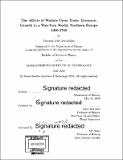| dc.contributor.advisor | Anne McCants. | en_US |
| dc.contributor.author | Kindfuller, Vincent John | en_US |
| dc.contributor.other | Massachusetts Institute of Technology. Department of Humanities. | en_US |
| dc.date.accessioned | 2016-09-30T19:32:23Z | |
| dc.date.available | 2016-09-30T19:32:23Z | |
| dc.date.copyright | 2016 | en_US |
| dc.date.issued | 2016 | en_US |
| dc.identifier.uri | http://hdl.handle.net/1721.1/104500 | |
| dc.description | Thesis: S.B. in History, Massachusetts Institute of Technology, Department of Humanities, 2016. | en_US |
| dc.description | Cataloged from PDF version of thesis. | en_US |
| dc.description | Includes bibliographical references (pages 57-60). | en_US |
| dc.description.abstract | Theories abound to describe how and why Europe was able to become the economic hegemon of the world between the 18th and 20th centuries. One of these theories is the competition argument, which argues that competition between the fractured states of Europe created the impetus for technological and institutional innovation which pushed Europe ahead of other areas of the world. However, these theories don't account for the negative effects that wars cause directly, which should detract from Europe's ability to stay competitive economically. In this thesis, I detail a theoretical model through which warfare in Europe increased trade, even though individual wars caused devastation and disruptions in trade. By requiring rulers to raise new revenue streams, warfare forced them to bargain for new resources. This bargaining granted concessions to cities and merchants, in the form of city charters and monopolies, which encouraged trade and therefore increased the economic well-being of the affected states. I focus on Northern Europe between 1000 and 1500, though I use examples from other times and places as well. | en_US |
| dc.format.extent | 60 pages | en_US |
| dc.language.iso | eng | en_US |
| dc.publisher | Massachusetts Institute of Technology | en_US |
| dc.rights | M.I.T. theses are protected by copyright. They may be viewed from this source for any purpose, but reproduction or distribution in any format is prohibited without written permission. See provided URL for inquiries about permission. | en_US |
| dc.rights.uri | http://dspace.mit.edu/handle/1721.1/7582 | en_US |
| dc.subject | Humanities. | en_US |
| dc.title | The affects of warfare upon trade : economic growth in a war-torn world, Northern Europe 1000-1700 by Vincent John Kindfuller. | en_US |
| dc.type | Thesis | en_US |
| dc.description.degree | S.B. in History | en_US |
| dc.contributor.department | Massachusetts Institute of Technology. Department of Humanities | |
| dc.identifier.oclc | 958278377 | en_US |
